
The Cars were an American rock band formed in Boston in 1976. Emerging from the new wave scene in the late 1970s, they consisted of Ric Ocasek, Benjamin Orr, Elliot Easton, Greg Hawkes (keyboards), and David Robinson (drums). Ocasek and Orr shared lead vocals, and Ocasek was the band's principal songwriter and leader.

Richard Theodore Otcasek, known as Ric Ocasek, was an American musician, singer, songwriter, and record producer. He was the primary vocalist, rhythm guitarist, songwriter, and frontman for the American new wave band the Cars. In addition to his work with the Cars, Ocasek recorded seven solo albums, and his song "Emotion in Motion" was a top 20 hit in the United States in 1986.

Candy-O is the second studio album by American new wave band the Cars, released on June 13, 1979, by Elektra Records.

Door to Door is the sixth studio album by American new wave band the Cars, released on August 25, 1987, by Elektra Records. The album was produced by frontman Ric Ocasek, with additional production by keyboardist Greg Hawkes. Three singles were released from the album, though only "You Are the Girl" reached the top 40 of the Billboard Hot 100, peaking at number 17. Door to Door became the Cars' lowest-charting studio album, peaking at number 26 on the Billboard 200, and within a year of its release the band would break up.

Benjamin Orr was an American musician best known as the bassist, co-lead vocalist, and co-founder of the new wave band the Cars. He sang lead vocals on several of their best-known songs, including "Just What I Needed", "Let's Go", ''Moving in Stereo'', and "Drive". He also had a moderate solo hit with "Stay the Night".
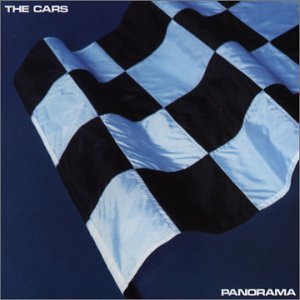
Panorama is the third studio album by American new wave band the Cars, released on August 15, 1980, by Elektra Records. Like its predecessors, it was produced by Roy Thomas Baker and released on Elektra Records.
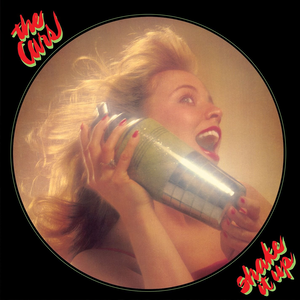
Shake It Up is the fourth studio album by American new wave band the Cars, released on November 6, 1981, by Elektra Records. It was the last Cars record to be produced by Roy Thomas Baker. A much more pop-oriented album than its predecessor, its title track became the band's first Billboard top-10 single. Spin magazine included it on their "50 Best Albums of 1981" list.

Heartbeat City is the fifth studio album by American new wave band the Cars, released on March 13, 1984, by Elektra Records. This marks the band's first album not produced by long-time producer Roy Thomas Baker, instead opting to produce with Robert John "Mutt" Lange. Considered a "comeback" album for the Cars, Heartbeat City represented a return to the success of the band's self-titled debut album.
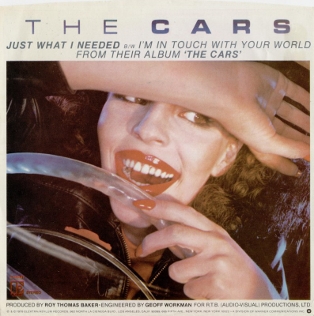
"Just What I Needed" is a song by American rock band the Cars from their self-titled debut album (1978). The song, which first achieved radio success as a demo, took inspiration from the Ohio Express and the Velvet Underground. The song is sung by bass player Benjamin Orr and was written by Ric Ocasek.
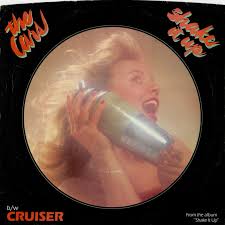
"Shake It Up" is a song by American rock band the Cars from their fourth studio album of the same name (1981). It was released on November 9, 1981, as the album's lead single. Although appearing for the first time in 1981, it was actually written years earlier by the band's songwriter and lead singer Ric Ocasek. The song became one of the Cars' most popular songs, peaking at number four on the Billboard Hot 100 and number two on the Billboard Top Tracks chart in early 1982. With the track "Cruiser" as its B-side, it reached number 14 on the Billboard Disco Top 80 chart.

The New Cars were a band formed in 2005 by two of the original members of the 1970s/1980s new wave band the Cars. The band was composed of original Cars members Elliot Easton and Greg Hawkes, along with vocalist/guitarist Todd Rundgren, bassist/vocalist Kasim Sulton, and drummer Prairie Prince. The band performed the Cars' songs, some new material, and selections from Rundgren's career.
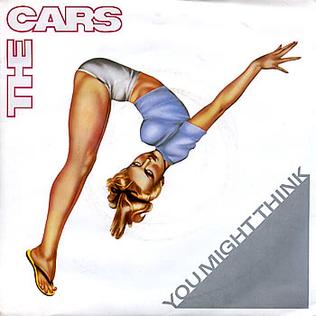
"You Might Think" is a song by American rock band the Cars from their fifth studio album, Heartbeat City (1984). The track was written by Ric Ocasek and produced by Mutt Lange and the Cars, with Ocasek also providing the lead vocals.

This Side of Paradise is the second solo studio album released by Ric Ocasek, lead singer and songwriter of the Cars. It was released in 1986 by Geffen Records. Though it was a solo album, other members of the Cars played significant roles. Greg Hawkes plays keyboards and bass throughout the album, and also co-wrote "Hello Darkness". Benjamin Orr is on backing vocals for three songs. Along with Hawkes and Orr, the track "True To You" also features Elliot Easton on guitar. Both production and drumming were by Chris Hughes. Hughes had been the recent producer of Tears for Fears most popular two albums. Steve Stevens from Billy Idol's band plays guitar on over half of the album.

"Good Times Roll" is a song by American rock band the Cars released as the first track from their 1978 debut album The Cars. Written by Ric Ocasek as a sarcastic comment on rock's idea of good times, the song features layered harmonies courtesy of producer Roy Thomas Baker.
"Bye Bye Love" is a song by the American Boston-based rock band The Cars. The song appears on the band's 1978 debut album The Cars. It was written by bandleader Ric Ocasek and sung by bassist Benjamin Orr. The song was featured in the 2011 science-fiction film Super 8.

"My Best Friend's Girl" is a song by American rock band the Cars from their 1978 self-titled debut album on Elektra Records, released on June 6 of that year. Written by Ocasek as a song about something that "probably ... happened to a lot of people," the track found radio success as a demo in 1977.

"It's All I Can Do" is a song by the American rock band the Cars. It is the third track from their 1979 album Candy-O. It was written by the band's leader and songwriter Ric Ocasek, and features bassist Benjamin Orr on vocals.

"Tonight She Comes" is a 1985 song by American rock band the Cars from their Greatest Hits album. It was released as a single in October 1985, reaching number seven on the Billboard Hot 100 in January 1986. The song reached number one on the Top Rock Tracks chart, where it stayed for three weeks.
"Candy-O" is a song by the American rock band the Cars, the title track of their 1979 album Candy-O. Written by Ric Ocasek, the song was not based on a real person. The song features a prominent guitar solo by Elliot Easton and lead vocals by bassist Benjamin Orr.

Move Like This is the seventh and final studio album by American rock band the Cars, released on May 10, 2011. It was their first since 1987's Door to Door, and the only one without bassist and vocalist Benjamin Orr, who had died of pancreatic cancer in 2000.


















